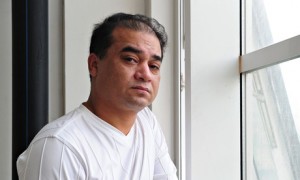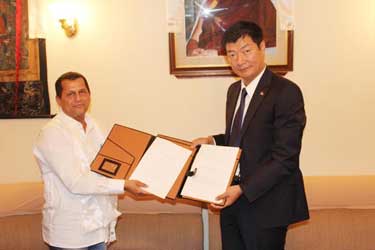US academic barred from China after speaking out over detained scholar
By Tania Branigan, The Guardian|July 7, 2014
Elliot Sperling believes his support for Uighur academic Ilham Tohti is reason authorities ordered him to return to US
A US academic has been barred from entering China after speaking out in support of detained Uighur scholar Ilham Tohti.
Elliot Sperling, a Tibetologist at the University of Indiana, was turned back on arrival at Beijing airport this weekend and ordered to board a flight returning to the US. No reason was given for the cancellation of his 90-day tourist visa, but he believes his vocal support for Tohti was responsible. He had visited China several times in the past few years without any problems, serving as visiting scholar at Peking University in 2011.
Several prominent China scholars have been refused visas in the past, but it is rare to be rejected after being granted one.

“I asked why I was being sent back and the man said: ‘I can’t tell you,'” said Sperling.
“I certainly have no expectation of shutting up because of it. The real focus for me is not being kicked out, but this business of demonising Ilham Tohti and part of that, I guess, is this isolation.”
Tohti, a leading economist and outspoken critic of government policies in north-western Xinjiang, has been detained since January and is charged with separatism. His lawyer Li Fangping, who was not allowed to see him until late last month, has said that the economist had been held in leg shackles for almost three weeks and denied food. When the 44-year-old won a US human rights award this spring, a Chinese foreign ministry spokesperson said that he was a criminal suspect and no one should interfere with China’s judicial independence.
Sperling, who is friends with Tohti, said: “We have had quite a number of talks and he is not an advocate of independence for Xinjiang, but a strong critic of policies affecting culture, religion, economic marginalisation.”
The US scholar added that he had thought it was possible he might face visa problems, but had been able to visit many times despite being outspoken on Tibetan issues.
He added: “I’m concerned about the message [this sends to other academics] and the way it is accepted. Part of its strength is the willingness of people to accept the dictates and certain – what I call authoritarian – norms.
“I do think on one level the power of such moves by China exists to the extent that we accord it power. If someone decides: ‘Maybe I had better keep quiet’, they are ceding that power.”
Sperling noted that his work was mostly historical and textual and that he had tenure, meaning that an inability to visit China should not affect his ability to keep a job, as it might for some scholars. Like many of those who have been affected by similar controls, he suggested universities had failed to speak out for freedoms in China, pointing to how keen many are to attract more Chinese students.
China’s foreign ministry had not responded to faxed queries about Sperling’s case at time of writing.
In 2011, it emerged that more than a dozen US academics had been prevented from travelling to China after publishing essays in a book on Xinjiang, although some later obtained visas. Several of the group, dubbed the “Xinjiang 13” by one member, suggested that there had been a lack of support from their institutions.
Other American China scholars banned from visiting the country include Perry Link, who smuggled a famed dissident into the US embassy during the crackdown on the Tiananmen Square pro-democracy protests of 1989, and Andrew Nathan, who co-edited a book of leaked documents about the 1989 movement with Link.

